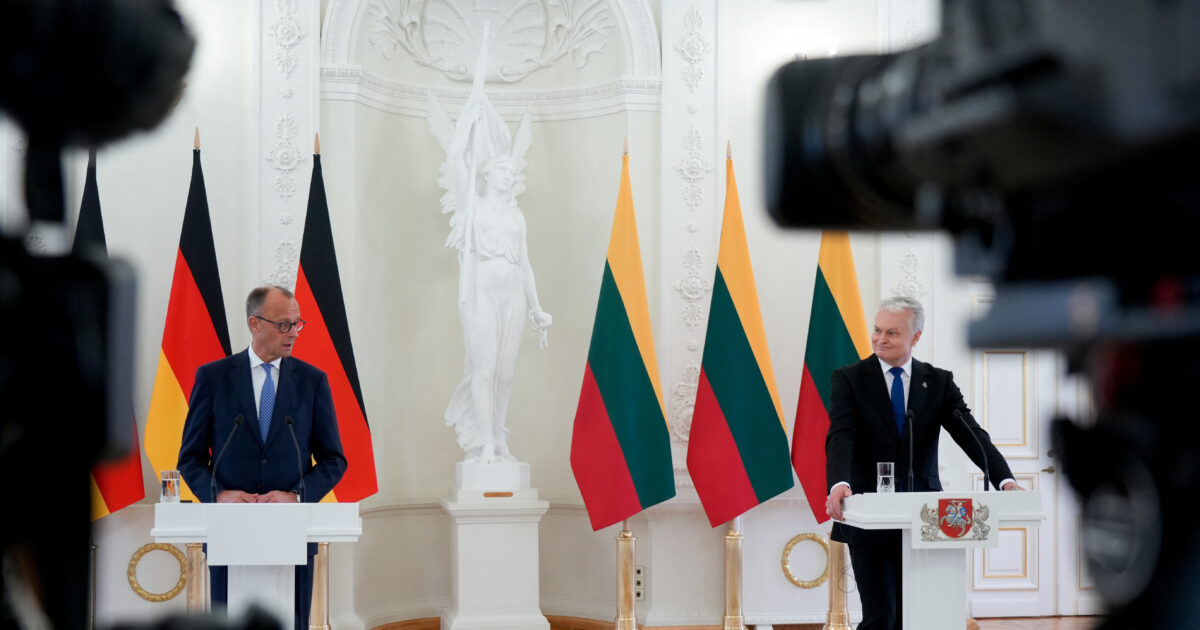‘The security situation here in the Baltic countries, the so -called east side of NATOremains very tense, “said German Chancellor, Friedrich Mertzas he appeared before the press with his host, Lithuanian President Gitanas Naoussea, and was transmitted by Handlesblatt.
“Russia’s aggressive revisionism” threatens not only Ukraine, but the entire Euro -Atlantic area. To address this threat, the German Brigade was formed “at a record speed”. “Let us now invest in our safety decisively,” Friedrich Merz calls on the other NATO partners.
For a long time, Germany was treated with suspicion due to its economic cooperation with Russia in the Baltic countries. He has now become a security guarantor. In his speech, Merz highlighted close cooperation with the German weapon industry: Lithuania buys tanks and infantry battlefields and Rheinmetall is manufacturing ammunition factory in the country.
“These are models for European cooperation in the field of equipment we need now,” the Chancellor says. Naoussa talks about the largest weapons contract in his country’s history and stresses that Lithuania will invest five percent of its financial power in defense as early as next year. Mertz also promises to increase funding for the Armed Forces.
In Vilnius, he explicitly supported the proposal of NATO Secretary General Mark Rutte to increase defense spending to 3.5% by 2032 and investment in military infrastructure – namely bridges, railways and ports – at 1.5%. This is “feasible,” Merts says.
Clear messages to Putin and Trump
The message from Vilnius is therefore addressed not only to Russian President Vladimir Putin, but also to Donald Trump. The impulsive president of the US insists that Europe should en masse its military spending. If he does not, he will recall the promise of alliance.
“We have no indication right now that the United States wants to withdraw troops from Europe,” Mertz assures – but at the same time stresses how great the nervousness of European capitals is.
Europe plays a group with the US “whenever possible”. But what is still possible with Trump? The US president shows no interest in a harsh policy towards Russia. Just a few days ago, he rejected new penalties in a telephone conversation with Merz and other European partners.
More pressure on Russia, more help for Ukraine – from now on this will be the primary duty of Europeans. The Lithuanian Brigade plays a decisive role in it. In 2023, Defense Minister Boris Pistorius proposed the rearrangement of the troops. Now it accompanies the Chancellor to the nominal draw. 400 soldiers are already there and by the end of 2027, when the brigade is fully operational, there will be 4,800.
The threat is specific and omnipresent present
Although Bundeswehr has been present in Lithuania since 2017, Germany is leading a multinational NATO unit, the so -called battle team.
But so far things are constantly changing, with soldiers spending only a few months on the east side of NATO and then replaced by other forces. With the permanent relocation of an entire brigade, including battle tanks and artillery, NATO creates a new military base just on the border with Russia.
Nowhere in NATO territory, the threat from Russia is not as specific as here, and the soldiers of the German Armed Forces also feel the impact. Russia is spreading misinformation, claiming online messages that Germans have raped Lithuanian women or killed locals while drunk. These are attempts to incite the population against NATO mission.
Russian challenges also happen repeatedly in the Baltic Sea. Ships of the so -called fleet of fleet, with which Russia bypasses western penalties for oil, is said to have caused damage to cables and deep water pipes.
Since the launch of US President Donald Trump’s second term, the climate in the Baltic countries has become even more tense than before. There is a great deal of skepticism that the US would send its own soldiers in the event of an attack on the Baltic countries.
The fact that the US temporarily suspended weapon deliveries to Ukraine in March and hid information from secret services on Russian troops that were vital to Kiev causes great concern in Lithuania, Latvia and Estonia.
That is why the whole area of the Baltic is happy with the German presence. “German military development in Lithuania reinforces the security and defense of all three Baltic countries,” Toms Rostoks, director of the Latvian National Defense Academy of Defense, told Handelsblatt. Given the “volatility and unpredictable nature” of US foreign policy, Germany’s increased involvement is “particularly important”.
Experts seek further support for Ukraine
Security expert Men Cassepamp, a professor at the University of Toronto, believes that the “removal of the Trump government from the allies and the approach of Putin’s Russia” has raised the question of whether the Baltic states can “continue to rely on NATO”. In order to prevent the Baltic states from becoming “the next goal of Russian aggression”, the West must continue to support Ukraine militarily. “And Europe urgently needs to increase its defense spending,” Kassepkam said.
Mertz intends to do just that. In Vilnius, he pledged both for the “enhancement of the Eastern side” and to “strengthen Ukraine’s military potential”. He is convinced that negotiations with Russia have the chance of success only if they are carried out by a position of power.
